C.J. Stone's Blog, page 12
February 14, 2019
The ongoing coup attempt in Venezuela
So the media are at it again, touting for another war.
As if Iraq, Libya, and Syria weren’t enough, now we have Venezuela to add to the list.
The excuse this time is that the president, Nicolás Maduro, is a dictator and must go. Meanwhile Juan Guaidó, leader of the National Assembly, has announced that he is now the interim president and has been duly recognised by a number of Western governments, including our own.
Well dictators come and go, and no one bats an eye; unless that is, the so-called dictator is sitting on a supply of oil that the Americans deem to be theirs.
Take the Saudis, for example, a corrupt medieval autocracy ruled by a single family: they can murder journalists, lop the heads off the opposition, repress women and gays, export terrorism and stone people to death. Who is talking about invading them?
Say what you like about Maduro – an incompetent leader presiding over a political and economic crisis (not unlike Theresa May) – he is, and remains, the democratically elected president of the country.
He received 67.8% of the vote in the presidential election of 2018, with a 46% turnout, under an electoral system that Jimmy Carter described as “the best in the world”.
That’s a more resounding victory than any of the politicians who are currently accusing him of being a dictator.
Imagine if Jeremy Corbyn was to announce himself the interim Prime Minister of the UK, and the Russians and the Chinese were to recognise him.
Well we’ve seen it all before, of course. What gets me is the way the media are lining up to back America’s obvious imperialist designs.
Almost exactly a week before the crisis began, the BBC showed a programme about Venezuela called “Revolution in Ruins”. Was that prescient or planned I wonder?
Since then we’ve been subjected to a relentless barrage of anti-Maduro propaganda. Even supposedly liberal left outlets like Channel 4 and the Guardian are joining in.
So we’ve seen Lindsey Hilsum for Channel 4 reporting from inside Venezuela on the breakdown of the economy, cheerleading for “humanitarian aid”, which has been called for by the opposition, but which Maduro has described as a Trojan Horse.
Given that the United States has been blocking aid from other countries, and has a known history of fomenting coups in Venezuela, including a 2002 attempt to overthrow the previous president, Hugo Chavez, that doesn’t seem at all unlikely.
If Maduro was really a dictator, would Lindsey Hilsum be allowed to roam freely throughout the country filing hostile reports?
Or what about Juan Guaidó: what self-respecting dictator would allow him free access to the world’s media? Do you think leaders of the opposition in Saudi Arabia are given such privileges?
The irony here is that Guaidó called Maduro a usurper, when he himself is actively conspiring with a foreign power to overthrow his own government.
There’s a word for that. Normally it is called treason.
The question is, at what point in Lindsey Hilsum’s career did she decide that it was the job of the independent media to aid and abet coup attempts in other people’s countries?
And meanwhile the Americans are huffing about the Russians interfering in their election by putting up posts on social media!
As Harold Pinter said, in his 2005 Nobel Laureate acceptance speech:
“You have to hand it to America. It has exercised a quite clinical manipulation of power worldwide while masquerading as a force for universal good. It’s a brilliant, even witty, highly successful act of hypnosis.”
That was during the Iraq war. Tell me: what has changed?
More about Venezuela:
Red Cross, UN Slam ‘Politicised’ USAID Humanitarian Assistance to Venezuela
Venezuela crisis: Former UN rapporteur says US sanctions are killing citizens
International politics and humanitarian aid collide in Venezuela
*************
From The Whitstable Gazette 14/02/19
The editor welcomes letters on any topical subject, but reserves the right to edit them. Letters must include your name and address even when emailed and a daytime telephone number.
Send letters to: The Editor, Room B119 Canterbury College, New Dover Road, Canterbury CT1 3AJ
fax: 01227 762415
January 31, 2019
Has Brexit Divided Britain?
Well Brexit is fun isn’t it? It’s like this insane soap-opera suddenly turned nightmarishly real, as if Dirty Den and J.R. Ewing had moved in next door and were even now conspiring to rob us of our wealth, our dignity and our self-esteem.
One of the peculiar side effects of the debate is the tendency of remain voters to blame those of us who voted to leave for the current crisis.
The logic of this is the assumption that, by expressing our opinion on the ballot sheet, as we were asked to do, we were consciously voting for Theresa May to make a complete mess of it.
Well no. The mess is all hers. There were always other options available to her. She could have reached out to the other parties at a much earlier stage. She could have got cross-party consensus. We could have entered the talks with Brussels as a united nation and negotiated a deal that would have had general support.
That she didn’t is a consequence of her own inadequacies as a human being – her secretiveness and and unwillingness to share, her desperation to cling on to power at any price – not of my vote.
Meanwhile the country is terminally divided. The left from the left, the right from the right, friends from friends, neighbours from neighbours, even members of the same family are divided against each other.
The whole whole debate is characterised by dismissiveness and rancour. People from either side are looking down at each other as if we were members of entirely different species.
A friend of mine recently had an old friendship terminated with the words “there’s no room for Leavers in my world”.
According to a recent survey, one in six of us has fallen out over Brexit. More than two thirds say that Britain is an unhappier place.
[image error]Neil Kinnock: “done very well out of the EU”
Some people have done very well out of the EU, of course. Neil Kinnock, for example, a working class lad from a mining village in South Wales, was an EU Commissioner, and is now a Life Peer and a millionaire.
On the other hand there are whole communities in the old industrial heartlands of the Midlands and the North who have been left behind, who have seen their industries decimated, their jobs destroyed, and their standard of living fall. It was these people who voted overwhelmingly to leave.
In other words, Leave was a protest vote. It was a cry of rage against the whole political class, who have ignored them, and against a system which has drained them of all hope for a better future.
Perhaps you will say that this has nothing to do with the EU: that the poverty and deprivation in certain parts of the UK are the consequence of austerity, of neoliberalism, and the current Tory government.
Perhaps you are right. But the truth is that this whole crisis is a long time in the making. Successive Tory and Labour governments have presided over the impoverishment of vast swathes of the population, and this has coincided with our membership of the EU.
In other words, people voted the way they did in order to alert the rest of us to their plight, and, whatever happens, whether we stay in the EU or not, whether we hold a second referendum, or accept Theresa May’s universally derided deal, with all its complications, those very real complaints will remain and will have to be dealt with.
It’s not that Brexit has divided Britain: it’s that Britain was already divided, and it has taken Brexit to make us aware of the fact.
[image error]
*************
From The Whitstable Gazette 31/01/19
The editor welcomes letters on any topical subject, but reserves the right to edit them. Letters must include your name and address even when emailed and a daytime telephone number.
Send letters to: The Editor, Room B119 Canterbury College, New Dover Road, Canterbury CT1 3AJ
fax: 01227 762415
email: kentishgazette@thekmgroup.co.uk
January 24, 2019
Life in a Van
When he lost his flat, writer CJ Stone decided to go on the road. How will he cope with life in the slow lane?
— The Big Issue, Aug 11th 1997
I Became a Traveller
I’m not a New Age Traveller. For a start, I don’t have dreadlocks. I don’t have nose rings or a baggy jumper. I don’t even have a dog on a piece of string. But I do live in a van.
I can’t say that I made the decision consciously or deliberately. It wasn’t a political statement. I lost my flat at the same time that my car needed its MOT, at the same time that I discovered that I needed a new engine. It would have cost me the best part of a thousand pounds to get it back on the road. I needed a vehicle and somewhere to live. Then I saw the advert: “Converted Ambulance for sale, £1600.” It was just around the corner from my Mom and Dad’s house. I fell in love with it immediately. I bargained him down to £1300, and two days later I was the proud owner of a 2 Litre Ford Transit Disability Transport Vehicle converted into a camper van.
Read more here.
[image error]From The Big Issue, Aug 11th 1997
January 17, 2019
In memory of Richard Stainton: Save Our Public Libraries
My latest, in memory of Richard Stainton, and to support the library campaign.
It was three years ago this month, in January 2016, that Richard Stainton died.
People in Whitstable will remember him. He was a dedicated campaigner and great friend of the town.
One of his campaigns was on behalf of Kent’s libraries. His “Save Our Public Libraries” petition gathered 4,127 signatures and was handed in to KCC in April 2015.
I feel sure that, were he around today, he would be collecting signatures to stop the planned reduction in hours of our county’s libraries.
The scheme, presently under public consultation, is to save £1 million by cutting the number of hours libraries will stay open.
For example: Ashford library could see a reduction in hours from 55 to 42 a week; Dartford from 57.5 to 42; Maidstone from 55 to 42; Dover from 55 to 37.
For Whitstable this could mean a reduction in hours from 59 to 37 a…
View original post 519 more words
January 3, 2019
May the New Year bring security
By the time you read this it will be New Year. As I’ve said before, when you start the year is arbitrary. Where does a circle begin or end? I start mine the day after solstice, when the light returns and the days are getting longer.
This year I went to see my friend Bapu up in London. He is an astrologer with an uncanny ability to read your innermost thoughts. He is also severely disabled and lives in a state of extreme poverty.
A few weeks ago he discovered that his benefits had been cut. No one told him this was going to happen, nor why. His only guess is that it must have something to do with Universal Credit.
His money was reduced from around £500 a month to a little more than £300. This is supposed to cover all his needs, including food, heating, lighting and rent.
Luckily for Bapu he lives in a housing co-op and his rent is very affordable. As a sitting tenant he is unlikely to be evicted.
While I was there I went shopping. It’s about fifteen minutes walk. On the way I passed two homeless people, a man and a woman. Unlike Bapu these are people who weren’t in secure accommodation when circumstances made their homes unaffordable.
We see so many people on the streets these days. The numbers are growing by the year. For the first time last year there were people begging in Whitstable. I’ve never seen that before.
How has this happened? What kind of a nation have we become that we see so many homeless people haunting our towns and cities?
I spoke to one person outside the Co-op. He said he was sleeping under a beach hut down by the tennis courts. It was a particularly cold night. I gave him some money then went home and got him a sleeping bag. He already had one, of course, a thin, blue nylon thing, but mine was much fluffier and more cosy. After I gave it to him he hugged me. I’ve never been hugged by a homeless person before.
According to the latest figures, the number of homeless in Canterbury has dropped this year, from 73, to 33. That may be true, but the fact we are seeing people in the outlying towns, where they never were before, should give us pause for thought.
In fact the numbers nationally have gone up by 20% while homeless deaths have increased by 24%. Almost 600 people have died on Britain’s streets in the last year. The average life-span for a homeless person is 44 for a man and 42 for a woman.
This is not to speak of the tens of thousands forced to sleep on people’s sofas or staying in hostels.
Meanwhile, of course, the number of billionaires, and their relative wealth, is increasing. The richest 100 people in Britain saw their value rise by £55.5 billion between 2010 and 2017.
There are multi-million pound flats sprouting up all over London. They are built as a store for wealth and as investment opportunities, not to live in. Most of them remain empty.
Don’t tell me these facts are unrelated.
The rise in wealth of the richest people in the UK would pay for brand new houses for all of our homeless. In fact it would make every one of them millionaires many times over.
So here’s wishing you a happy New Year. May the returning light bring you health and prosperity. May the homeless find warmth and security, and may those whose selfishness has deprived our world of justice and humanity awaken to their responsibilities at last.
*************
From The Whitstable Gazette 03/01/19
The editor welcomes letters on any topical subject, but reserves the right to edit them. Letters must include your name and address even when emailed and a daytime telephone number.
Send letters to: The Editor, Room B119 Canterbury College, New Dover Road, Canterbury CT1 3AJ
fax: 01227 762415
email: kentishgazette@thekmgroup.co.uk
December 13, 2018
BT: Bloody Terrible
Since I’ve moved I’ve had to do without broadband.
Initially this was because BT messed up my order. I was supposed to have had my account transferred from my old address on the day of the move but, despite over a month’s notice, and all their clever software, they managed to lose track of me.
One day before the move I got an email telling me that the transfer wouldn’t take place for another week.
By that point it had finally dawned on me just how expensive my broadband was. I won’t go into the details. Let’s just say that, talking to my son, and to friends, I discovered that I was paying over a third more for a significantly smaller service.
How had this happened? Simple. I was a loyal customer, and in this age of instant gratification loyalty is no longer a valued commodity. It is taken for granted.
So I cancelled the order. It was at this point, magically, that BT starting telling me about all the other great deals they had on offer.
After this I started having some really interesting telephone conversations with BT’s so-called “loyalty advisors”. It’s funny how my loyalty wasn’t even considered an issue until I decided to move.
One of them asked me why I didn’t check my tariffs on a monthly basis? Why? Because I was brought up in an age where BT was the only telecommunications company around.
Until fairly recently, in fact, it still had the monopoly on the provision of landlines. You didn’t even get a choice.
Nowadays there are several companies offering the service and it really is a free market. There is a bewildering array of deals on offer. The only real difficulty is in deciding which one suits you best.
So I’ve decided to do without a landline altogether. I’ve got a little gizmo which provides mobile WiFi: called MiFi for short. All I’m waiting for is the data-only sim with my data allowance on it.
Listen to me! A 65 year old retiree talking about MiFi and data-only sims. You have to learn to adapt in this new world of ours.
Meanwhile I’ve been doing without the internet. I haven’t seen Facebook or YouTube in days, and, once I do get them back, I will have to ration them.
I don’t miss them at all. I’ve started reading books again. I’m going for long walks and visiting friends, meditating on the meaning of existence and my part in it. Contemplating the future.
It’s amazing how quick this technology has taken over. Facebook was only founded in 2004, YouTube in 2005.
In hardly more than a decade these companies have come to rule the world. Amazon just used to sell books. Now it sells everything. We’ve come to depend upon them for our everyday existence.
Meanwhile, the technology is becoming ever more intrusive. They can track your movements in real time, turn on the microphone on your phone and listen to your conversations, watch you undress from the camera on your laptop.
You think I’m exaggerating? Check out Oliver Stone’s film about Edward Snowden if you don’t believe me. George Orwell’s predictions are coming true.
The funniest conversation I had with BT involved one of their loyalty advisors asking me which company was going to take over my broadband?
“None,” I said.
“But who will be providing your TV service?”
“No one,” I said.
“What about the internet?”
“I’ll do without,” I said.
They couldn’t believe that anyone in this day and age could live without them.
I’m about to prove them wrong.
*************
From The Whitstable Gazette 13/12/18
The editor welcomes letters on any topical subject, but reserves the right to edit them. Letters must include your name and address even when emailed and a daytime telephone number.
Send letters to: The Editor, Room B119 Canterbury College, New Dover Road, Canterbury CT1 3AJ
fax: 01227 762415
email: kentishgazette@thekmgroup.co.uk
December 6, 2018
The Closure of Glebe Way Crossing
In case you haven’t heard yet, Kent County Council are planning to close the pedestrian crossing over the railway line between Glebe Way and Clifton Road in Whitstable.
This is being done at the request of Network Rail, who cite safety issues. These include: the high level of use and the time it takes to cross; possible difficulties in the sighting of trains, and the suggestion that the sound of trains might be obscured by background noise, amongst other things.
I have to say this last one seems a little exaggerated as neither Clifton Road nor Glebe Way are busy, and I can’t imagine a time when the hiss of the wind or the twittering of bird song would be loud enough to drown out the roar of a passing train.
But I do understand why this is being done. Network Rail refer to 33 incidents between 1998 and 2016, including four fatalities. The most recent of these was the death of a schoolgirl in 2015, who was hit by a train while listening to music on headphones.
There was also the spate of suicides back in 2011, and at least one attempted suicide, plus a number of near misses. It’s obvious that it is a dangerous crossing.
But does this mean that it has to be closed? Wouldn’t it be more intelligent – and just as effective – to increase safety measures at the crossing?
For instance, there could be gates which are locked automatically when triggered by an approaching train. There could be flashing lights, and a louder horn. This is the method used on roads when they cross railway lines. There are barriers which come down and stop the traffic from moving. Why can’t something similar be applied to a pedestrian crossing?
Or are we saying that pedestrians are less important than car drivers and are therefore entitled to less money being spent on them?
This is an immensely popular route, followed by tens of thousands of people every year. In March 2015 Network Rail did a survey which showed that the crossing was used, on average, 201 times a day. That amounts to 73,000 crossings a year, or 1.3 million crossings over the period in which they themselves note only 33 incidents.
The alternative route is said to be the bridge crossing the line 200 yards down the track. 200 yards doesn’t sound too far. But this doesn’t take into account where the other path leads: to Alexandra Road and Joy Lane, not to Glebe Way. It’s at least a mile further, which would not please pensioners or the disabled. It also involves climbing steps, which would be impossible for many.
The footpath is a right of way. It was there before the railway. It was probably there before much of Whitstable was built and, despite the fact it is designated on the map as Footpaths CW80 and CWX40 combined, it’s obvious that it is, in reality, a continuation of Glebe Way itself, which cuts off from Canterbury Road, and runs in a continuous line to Portway and West Cliff, and from there to the beach.
The Glebe Way estate is a recent addition to the landscape.
A “glebe” was a piece of land which provided income for the clergy; but its more ancient meaning is simply “land” or “fields”.
Thus “Glebe Way” could be understood as a route through to our understanding of ourselves and our relationship to land and history.
If you would like to object to the closure please write to Mrs Maria McLauchlan at maria.mclauchlan@kent.gov.uk, or via Invicta House, County Hall, Maidstone ME14 1XX. The closing date is tomrrow, 07/012/18
*************
From The Whitstable Gazette 29/11/18
The editor welcomes letters on any topical subject, but reserves the right to edit them. Letters must include your name and address even when emailed and a daytime telephone number.
Send letters to: The Editor, Room B119 Canterbury College, New Dover Road, Canterbury CT1 3AJ
fax: 01227 762415
email: kentishgazette@thekmgroup.co.uk
November 16, 2018
The Ghosts of Things
So I’ve managed to move at last. Three days of intense activity, driving to and fro between the two addresses, two days of cleaning, a whole day of tidying up, and now, here I am, firmly established in my new home.
I’m sitting in my room, having found a place for everything at last: surrounded by all my ornaments, my books, my pictures, feeling homely and comfortable.
It’s odd how inanimate things can carry such a weight of meaning. They are only objects after all. They have no life. And yet, looking at my things, seeing them across the room, it’s as if I bring them to life with my awareness, as if, by holding them in view, they draw something from me that makes them alive.
There’s a shared history there. They are familiar to me. They remind me of my family.
[image error]“It’s been in my life for as long as I can remember….”
Take that green and yellow pottery parrot, for instance. It sits on the shelf on the bookcase between two rows of books – between Confucius and Karl Marx, the I-Ching and the Communist Manifesto – perched on a pottery tree stump, hunched forward slightly, as if it’s about to take off.
I don’t know how old it is. It probably has no financial value. There’s a chunk out of the base which someone has tried to glue back in.
It’s been in my life for as long as I can remember. Always there, always in the background, always poised in that same position, on the threshold of flight.
I rescued it from my Dad’s house, before we got rid of the furniture.
It was in a glass-fronted cabinet in the dining room, where my Mum had obviously placed it for safe keeping. I don’t know why she valued it. I don’t know why I do either. I guess because it reminds me of her.
There’s an old wooden clock ticking away on the shelf above. I found that in Dad’s attic. It used to be in my bedroom when I was a little boy. And on the shelf beneath there are three miniature urns, not much bigger than eggcups, which once contained Creme de Menthe.
I drank the entire contents of all three when I was about eight years old. I popped the foil seals, squeezed down the corks with my thumb, and sipped the sickly, sweet liquid with guilty glee. I don’t know if I liked the taste or the effect, but I was sure Mum wouldn’t like it if she found out. I’ve been carrying the guilt ever since.
They came from Malta, where Dad was stationed in the 50s. Dad was in the Navy. Mum and I joined him and, later, my sister Julia was born there. We spent several years on that sun-soaked little island, during which time I lost my Brummie accent and became as sunburnt as a native. Looking at the urns reminds me of the island, the crumbling limestone walls, the harbour full of ships, the wild seas and the dusty streets.
If anyone looked at this stuff they would consider it junk. None of it has any value. And yet there are stories there, stories which only I know. Stories that will be lost once I am gone.
I think that’s why I am a writer. A writer is interested in stories. It’s the stories that make the objects come alive. Without the stories they are nothing but bits of tat upon a shelf.
I won’t go on listing my possessions. Suffice it to say that they all have meaning, they all have a place, that they are all inscribed upon my life in some way and that I am incomplete without them.
*************
From The Whitstable Gazette 15/11/18
The editor welcomes letters on any topical subject, but reserves the right to edit them. Letters must include your name and address even when emailed and a daytime telephone number.
Send letters to: The Editor, Room B119 Canterbury College, New Dover Road, Canterbury CT1 3AJ
fax: 01227 762415
email: kentishgazette@thekmgroup.co.uk
The Ghost of Possessions
So I’ve managed to move at last. Three days of intense activity, driving to and fro between the two addresses, two days of cleaning, a whole day of tidying up, and now, here I am, firmly established in my new home.
I’m sitting in my room, having found a place for everything at last: surrounded by all my ornaments, my books, my pictures, feeling homely and comfortable.
It’s odd how inanimate things can carry such a weight of meaning. They are only objects after all. They have no life. And yet, looking at my things, seeing them across the room, it’s as if I bring them to life with my awareness, as if, by holding them in view, they draw something from me that makes them alive.
There’s a shared history there. They are familiar to me. They remind me of my family.
[image error]“It’s been in my life for as long as I can remember….”
Take that green and yellow pottery parrot, for instance. It sits on the shelf on the bookcase between two rows of books – between Confucius and Karl Marx, the I-Ching and the Communist Manifesto – perched on a pottery tree stump, hunched forward slightly, as if it’s about to take off.
I don’t know how old it is. It probably has no financial value. There’s a chunk out of the base which someone has tried to glue back in.
It’s been in my life for as long as I can remember. Always there, always in the background, always poised in that same position, on the threshold of flight.
I rescued it from my Dad’s house, before we got rid of the furniture.
It was in a glass-fronted cabinet in the dining room, where my Mum had obviously placed it for safe keeping. I don’t know why she valued it. I don’t know why I do either. I guess because it reminds me of her.
There’s an old wooden clock ticking away on the shelf above. I found that in Dad’s attic. It used to be in my bedroom when I was a little boy. And on the shelf beneath there are three miniature urns, not much bigger than eggcups, which once contained Creme de Menthe.
I drank the entire contents of all three when I was about eight years old. I popped the foil seals, squeezed down the corks with my thumb, and sipped the sickly, sweet liquid with guilty glee. I don’t know if I liked the taste or the effect, but I was sure Mum wouldn’t like it if she found out. I’ve been carrying the guilt ever since.
They came from Malta, where Dad was stationed in the 50s. Dad was in the Navy. Mum and I joined him and, later, my sister Julia was born there. We spent several years on that sun-soaked little island, during which time I lost my Brummie accent and became as sunburnt as a native. Looking at the urns reminds me of the island, the crumbling limestone walls, the harbour full of ships, the wild seas and the dusty streets.
If anyone looked at this stuff they would consider it junk. None of it has any value. And yet there are stories there, stories which only I know. Stories that will be lost once I am gone.
I think that’s why I am a writer. A writer is interested in stories. It’s the stories that make the objects come alive. Without the stories they are nothing but bits of tat upon a shelf.
I won’t go on listing my possessions. Suffice it to say that they all have meaning, they all have a place, that they are all inscribed upon my life in some way and that I am incomplete without them.
*************
From The Whitstable Gazette 15/11/18
The editor welcomes letters on any topical subject, but reserves the right to edit them. Letters must include your name and address even when emailed and a daytime telephone number.
Send letters to: The Editor, Room B119 Canterbury College, New Dover Road, Canterbury CT1 3AJ
fax: 01227 762415
email: kentishgazette@thekmgroup.co.uk
October 27, 2018
Ian Pollock’s Illustrations for Housing Benefit Hill
Housing Benefit Hill was a series of columns which appeared in the Guardian Weekend between September 1993 and September 1996. Originally it featured a cartoon series by Steven Appleby, which were very funny, but not specifically intended as illustrations of the text. (Mind you, sometimes they could be accidentally appropriate). However in September 1995 the editors at the Guardian commissioned Ian Pollock to illustrate the stories, and the results are shown below.
They are remarkable drawings, not least because somehow or another Ian seemed to be able to capture not only the essence of the story, but the actual appearance of some of the characters. It was genuinely uncanny. I never met Ian, and, as far as I know, he never visited the people or places I was talking about, and yet, on the scantiest of information, he was able to do a portrait of that person of such accuracy it was as if they were sitting for him as a model.
1. Ex marks the spot
 September 9th 1995
September 9th 1995The first story involved a visit to Mid Wales, where I’d gone to write my book.
It was during my stay here that I met Rose Simpson of the Incredible String Band, who had been the Lady Mayoress of the village at some point.
I later used this story in Fierce Dancing, which included an interview with Rose Simpson. You can read that here.
Ian’s picture shows an imagined scene inside the pub where I used to go after a day’s writing.
The traditional headgear of the Welsh lady in the picture is referred to in terms of the Incredible String Band song If I Was A Witches Hat:
“If I was a witches hat
Sitting on her head like a paraffin stove
I’d fly away and be a bat
Through the air I would rove….”
The ex-Army Officer behind the bar is looking suitably wan and the Welsh dragon on the table is drinking from a whiskey glass.
This was a nice first picture to go with the series, but it doesn’t manage to pack quite the punch of the later images, which get more and more telepathically accurate as the series continues.
2. Deeper and down
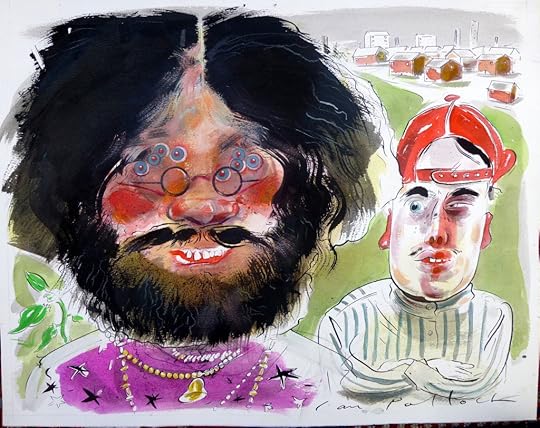 October 7 1995
October 7 1995The next story is about my friend Steven Andrews, at that time living on a council estate in Cardiff. The picture shows him with his son Isaac, with the council estate in the background.
This is the first of Ian’s remarkable portraits that bear an uncanny resemblance to the character I describe.
This is Steve in earlier years, before he began to go bald. I love the fact that Ian has given him several sets of eyes and that his son is looking at him askance, as if slightly embarrassed about his flamboyantly dressed hippie Dad: which I think was probably very close to the truth, though I make no mention of it in the story.
I based my second book, The Last of the Hippies, largely around Steve, and the central story here, about Steve being overtaken with the munchies, became a whole chapter in that book.
3. Caged Beest
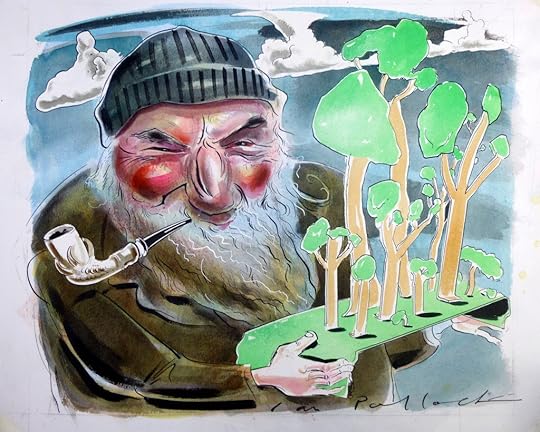 November 4 1995
November 4 1995The next story is about Andre Van Beest, a retired person I used to visit in a warden assisted council home in Sittingbourne in the nineties.
Andre was a very singular person. He’d been a sort of hermit, living in a shed in Cobham Woods near Strood in Kent for a number of years, before the council managed to remove him.
His story had appeared in all the local papers and he was well known in the region.
He was a tough, wiry character, incredibly fit for his age. He was probably in his 70s when I met him, maybe even older, but his body was as taut and muscular as a 20 year old.
I’d written to him after seeing an article about him in one of the local papers, about the fact that he was being made to live in a warden assisted flat. He had a dog which was half-fox which had been taken off him and put down when he moved something which he said broke his heart.
He was a model rail enthusiast, and at least half of his bed-sitting room was filled with a gigantic model railway set, which he used to get going every time I visited.
Ian’s picture is absolutely uncanny in its accuracy.
In the previous story I’d described Steve as looking like Roy Wood of Wizzard, which was probably a helpful indicator for Ian’s development of the illustration, but there was no such hint in Andre’s story. He was “a gnarled pixie” and he had a cleft palate. That’s all I’d said. And yet it’s like Andre has been brought alive in the image, clutching a papier-mâché model of Cobham Woods, where he had once lived, to go with his railway set.
You can read the story here.
4. Ain’t life a bitch?
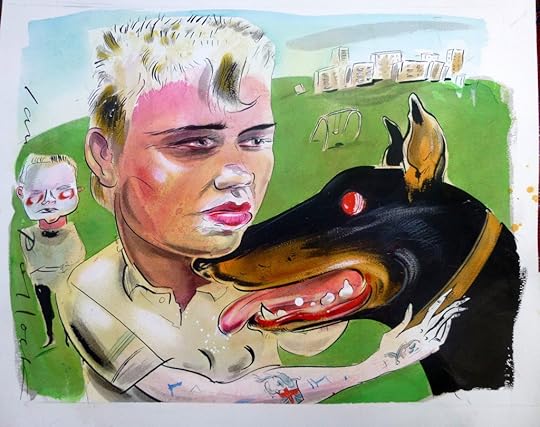 December 2 1995
December 2 1995Housing Benefit Hill was supposed to be about the council estate where I lived while I was writing these stories, but over the years I’d drifted away from it as my principle subject matter.
Many of the earlier stories had been quite sad. They were about poverty and deprivation, about isolation, about loss. There were some happier stories too, but the majority of them were decidedly downbeat.
However, once it became known that I was writing the stories, it became more and more difficult to continue in this vein. People began to object. Rightly so, as the stories were intrusive, bringing accidental attention to people who weren’t really asking for it.
My stories moved location, to other council estates in other parts of the country, and featured other characters than the ones who lived nearby. They became about people who wanted to be written about, as opposed to people who didn’t. The atmosphere lifted too. They were more upbeat, funnier, about people who enjoyed themselves, despite their poverty, as opposed to people who had been largely ground-down by it.
This story is the exception.
Kerry was a neighbour and she had a dog called Roma, who had to be put-down. I’d driven them to the Vets, which is how I came to write this story.
Again, Ian’s illustration is remarkable in its accuracy. Again, there is nothing in the story to indicate how Kerry should appear.
It’s like there’s a sort of magic going on here, as if Ian has, by some sort of osmosis, absorbed the essence of the story and is then able to illustrate it. It’s as if he’d been there, with me, on that day when I took Kerry to the vets to have Roma put down.
5. Rubber soul
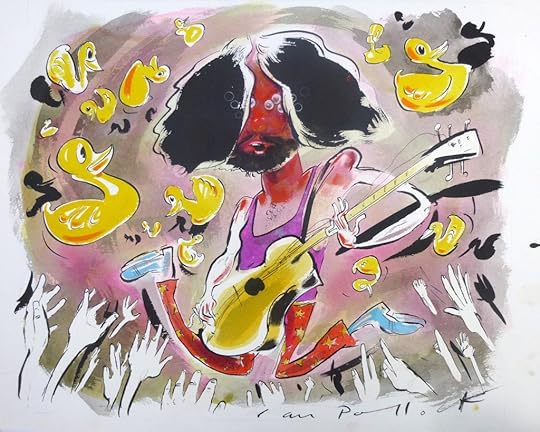 January 6 1996
January 6 1996Rubber soul is another of my stories about Steve, about the first song he ever wrote, which was called Extracting the Latex From a Rubber Ducky. It was a nonsense song, nevertheless it acquired a certain fame. People liked it and Steve became very popular on the back of it. Unfortunately, he also hated it. The more people wanted to hear it, the more he resented it. He wanted to be taken seriously as a songwriter, but people just expected all this nonsense from him. Eventually he killed the Rubber Duck live on stage, but people still wanted to hear the song. Years later he realised that he should have been more grateful for this short-lived burst of fame on the back of one song.
Again, Ian’s picture shows Steve, very much in his element, again with several sets of eyes, surrounded by rubber ducks, in a pair of red satin trousers with yellow stars, which I’d described in the text.
This is one of Steve’s best stories, once again brilliantly illustrated by Ian Pollack.
You can read the story here.
6. Lonesome trucker
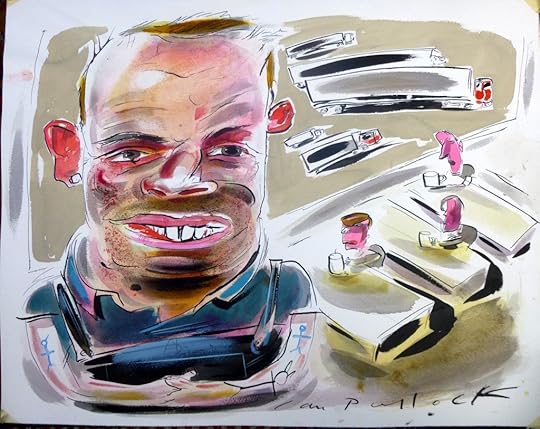 January 27 1996
January 27 1996The next story features Stan the lorry driver, who I’d got to know during a road protest.
It was based on an interview I’d done with him in his caravan which was parked up on a bit of land just outside the town.
He was a sort of loquacious loner, with a lot of interesting and eccentric opinions about life. He was particularly insightful about what made people become lorry drivers.
They were loners, he told me: “Go into any truck-stop and you’ll see them,” he said. “Twenty trucks, 20 lorry drivers, one driver at each table sitting alone with his pint.”
And once again Ian has got Stan down to a tee. This is pretty much what Stan looked like. Same distracted look. Same unshaven face. Same crooked nose and beetroot coloured ears. More than anything, though, this is a kind of spiritual portrait: an image of the inner Stan. Seeing this picture for the first time, and knowing Stan, you would have sworn that Ian Pollack had been there at the interview with me, had heard the man as he spoke about his life, had sat with him drinking tea in his caravan looking out over the lonely fields above our town.
7. Time travel
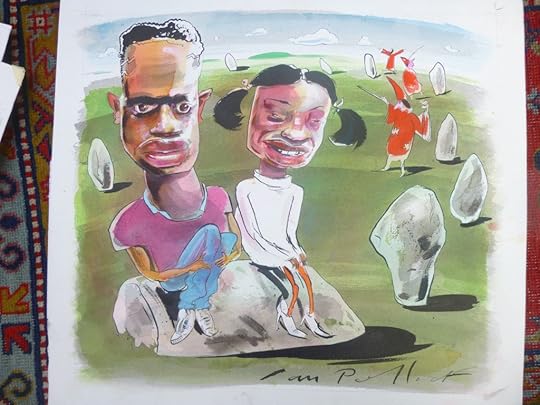 February 24 1996
February 24 1996This story features in my book, the Trials of Arthur Revised Edition.
It dates from the time, in the mid-nineties, when I was on a quest to find the famous biker turned Eco-Warrior, King Arthur Pendragon.
It involves a bus journey out of St Pauls in Bristol with my friend Ornella, and a party of people, including two West Indian kids called Quelly and Jehenelle. We were off to Avebury to meet the Druids. I was doing a lot of that at the time.
Ian’s picture captures the essence of the occasion, with the two kids sitting on a stone, while a bunch of Merlins in the background, arms raised majestically, practice their mystical rites.
I no longer see Ornella, and I no longer visit St Pauls, but it’s great to have a memento of the day.
8. Primordial booze
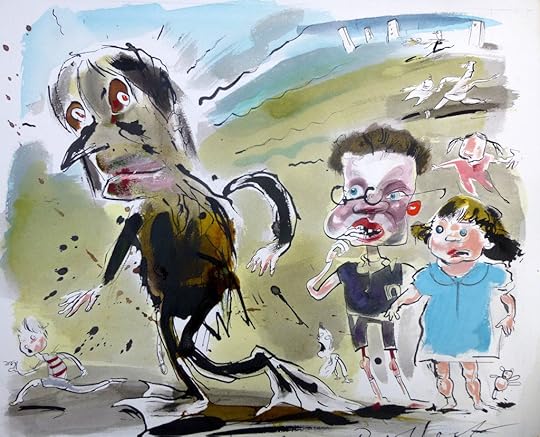 March 23 1996
March 23 1996This is another story about Steve Andrews, also known as The Bard of Ely.
It’s a very funny story which I also used in my book, The Last of the Hippies. It involved Steve falling into Cardiff Docks with a friend, Rod the Mod, and having to be rescued.
In this case Ian hasn’t drawn Steve looking like Steve. In fact he’s drawn him looking like The Creature From The Black Lagoon, which is precisely how I’d described him in the text.
9. Off the Grails
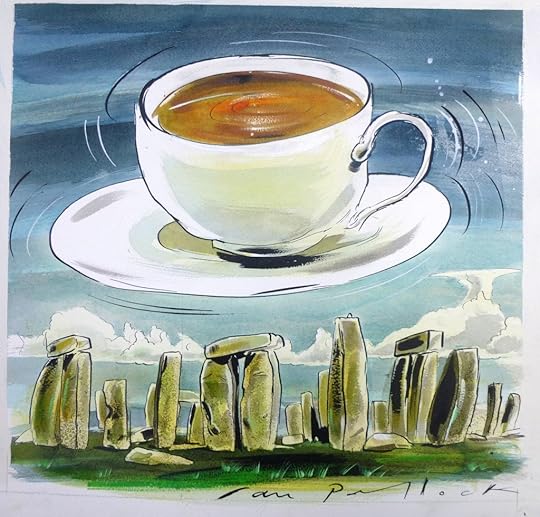 April 27 1996
April 27 1996“The Holy Grail is a cup of tea”.
What more can you say?
You can read the story here.
10. The young pretender
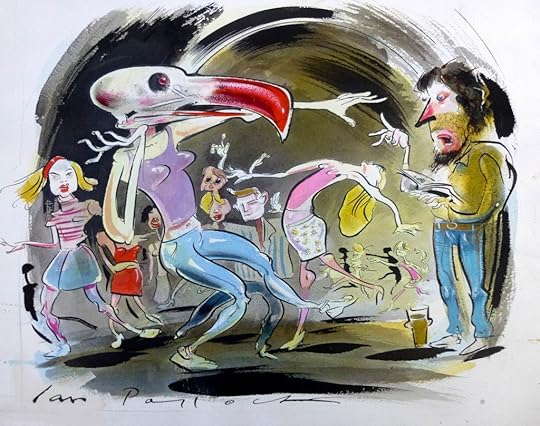 May 25 1996
May 25 1996This is the story that ensured that my Housing Benefit Hill column was about to come to an end.
The editor, Deborah Orr (now a Guardian columnist) told me later that when she read this story it occurred to her that I’d strayed so far away from the original subject matter that it was time to draw the series to a close.
It was after this that I began the series known as CJ Stone’s Britain, which are all available here.
This one describes me doing a reading from my recently published book,  Fierce Dancing, at a rave party in London, very nicely drawn by Ian Pollack.
Fierce Dancing, at a rave party in London, very nicely drawn by Ian Pollack.
11. Search me
 June 22 1996
June 22 1996This story was about my son Joe getting himself imprisoned for a night after a late-night jaunt with his friends.
Once again Ian has managed to capture the image of my son, despite never having met him, looking suitably forlorn in a prison cell. The only thing he’s got wrong is the colour of Joe’s eyes, which are brown not green.
12. Sitting target
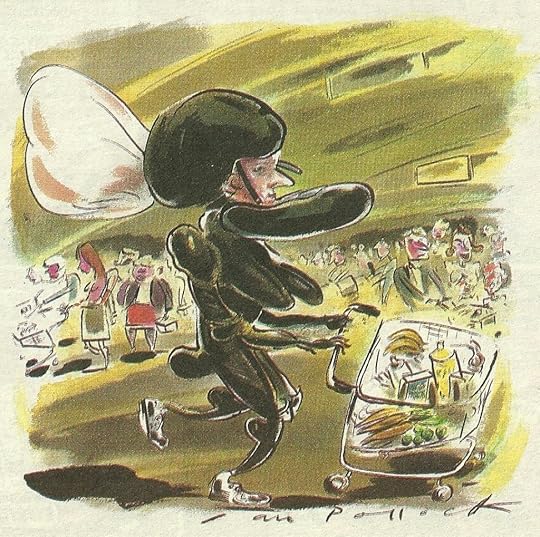 July 20 1996
July 20 1996This is an absolutely stunning image of an event which really did take place in our town. It’s a drawing of my friend Mark Fuller, a local artist, dressed up in a rubber suit, which he had made and donned for a performance art event called Neighbourhood Watch.
I did describe the event in the text, but Ian has managed to capture the essence of it to perfection, with the image of Mark, dressed like an “insectizoid alien”, pushing a shopping trolley in some insane ritual of self-humiliation.
The drawing is as near to perfection as I can imagine.
You can read this story here.
13. Psychic weather
 August 17 1996
August 17 1996This is the penultimate story in the series, and involves an adventure with another of my regular characters, Fen, who also appears in Fierce Dancing.
14. Over the hill
 September 7 1996
September 7 1996The final story in the series, describing me on an opiate binge meeting with a bunch of speed freaks about to cause damage late one night on Housing Benefit Hill.
These columns have to go down as my most successful writing ever, and I was sorry to see it end.
My thanks to Ian Pollack for having brought these stories to life with his amazing pictures.
I’ve always said that we should do something together sometime in the not-too distant future.
I hope one day we can make this wish come true.
Ian Pollock
Ian Pollock’s website
Housing Benefit Hill links
Read some of the stories here.




